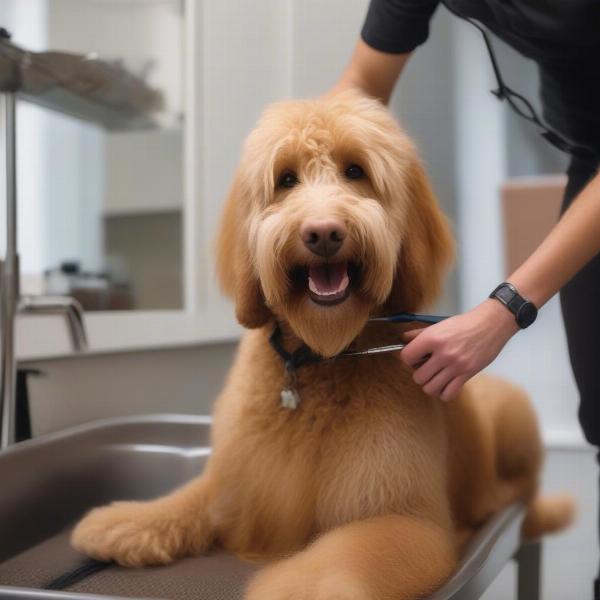The term “gold dog” often evokes images of shimmering, majestic canines. While not a recognized breed, “gold dog” can refer to several breeds with golden coats, like Golden Retrievers, Goldendoodles, or even specific mixed breeds. This article dives into the world of “gold dogs,” exploring popular breeds, their unique care requirements, and what makes them such beloved companions. We’ll help you understand what to expect if you’re considering bringing a golden-coated friend into your life.
Decoding “Gold Dog”: Which Breeds Are We Talking About?
“Gold dog” isn’t an official breed classification. It’s a descriptive term used for dogs with golden or yellowish coats. This can include a variety of breeds, each with its own distinct personality and needs. Let’s explore some of the most popular breeds often associated with the “gold dog” moniker:
- Golden Retrievers: Known for their friendly nature and intelligence, Golden Retrievers are a classic example of a “gold dog.” They are energetic, love to play, and are highly trainable.
- Goldendoodles: A mix between a Golden Retriever and a Poodle, Goldendoodles inherit the best traits of both breeds. Their golden coats are often low-shedding, making them a good choice for allergy sufferers.
- Yellow Labradors: While often referred to as “yellow,” Labrador Retrievers can range in color from a pale yellow to a rich, fox-red. These loyal and affectionate dogs are also excellent family pets.
- Other Gold-Coated Breeds: Several other breeds can also sport golden coats, including Irish Setters, Brittany Spaniels, and even some mixed breeds.
Caring for Your Gold Dog: Essential Tips
Regardless of the specific breed, caring for a “gold dog” involves meeting their physical and emotional needs. Here are some essential tips for keeping your golden companion happy and healthy:
- Grooming: Regular brushing is essential to maintain a healthy, shiny coat. Gold-coated dogs, especially those with longer fur, can be prone to matting.
- Exercise: Most “gold dogs” are energetic breeds that require regular exercise to stay fit and prevent boredom. Daily walks, runs, and playtime are essential.
- Training: Early socialization and obedience training are crucial for any dog, including “gold dogs.” Their intelligence makes them quick learners, but consistent training is key.
- Nutrition: Feeding a high-quality dog food formulated for their age and activity level is essential for their overall health and well-being.
 Goldendoodle Being Groomed
Goldendoodle Being Groomed
Health Considerations for Gold Dogs
While “gold dogs” are generally healthy, certain breeds are predisposed to specific health issues. It’s important to be aware of these potential problems and work with your veterinarian to ensure early detection and treatment.
- Hip and Elbow Dysplasia: Large breeds like Golden Retrievers are prone to these joint conditions.
- Cancer: Unfortunately, Golden Retrievers have a higher risk of developing certain types of cancer.
- Eye Problems: Progressive retinal atrophy and cataracts are potential eye issues in some “gold dogs.”
Is a “Gold Dog” Right for You?
“Gold dogs,” with their radiant coats and charming personalities, make wonderful companions for a variety of households. However, it’s essential to research the specific breed you are considering to ensure it aligns with your lifestyle and ability to meet their needs. Consider their exercise requirements, grooming needs, and potential health issues before making a decision.
Conclusion
“Gold dogs” encompass a diverse group of breeds, all united by their beautiful golden coats. Whether you’re drawn to the classic Golden Retriever, the hypoallergenic Goldendoodle, or another golden-coated breed, understanding their unique needs is essential for responsible ownership. With proper care, training, and attention, a “gold dog” can bring years of love and joy to your life.
FAQs
- What is a “gold dog”? “Gold dog” is a descriptive term for dogs with golden or yellowish coats, encompassing various breeds.
- Are “gold dogs” hypoallergenic? Some “gold dogs,” like Goldendoodles, are often considered low-shedding, but true hypoallergenic dogs are rare.
- How much exercise do “gold dogs” need? Most “gold dogs” are energetic and require at least an hour of exercise daily.
- What are common health problems in “gold dogs”? Hip dysplasia, cancer, and certain eye conditions can be concerns in some “gold dog” breeds.
- Are “gold dogs” good family pets? Many “gold dogs” are known for their friendly and gentle nature, making them excellent family companions.
Related Articles on ILM Dog
About ILM Dog
ILM Dog is your trusted global resource for all things dog-related. We offer expert advice on dog breeds, health, training, nutrition, grooming, and much more. Whether you’re a seasoned dog owner or just starting your journey, we provide practical, reliable information to help you provide the best possible care for your canine companion. From choosing the right breed to understanding their nutritional needs, ILM Dog is here to support you every step of the way. Contact us at [email protected] or +44 20-3965-8624 for expert guidance on dog care and products. Find more valuable resources and connect with our community at ILM Dog.